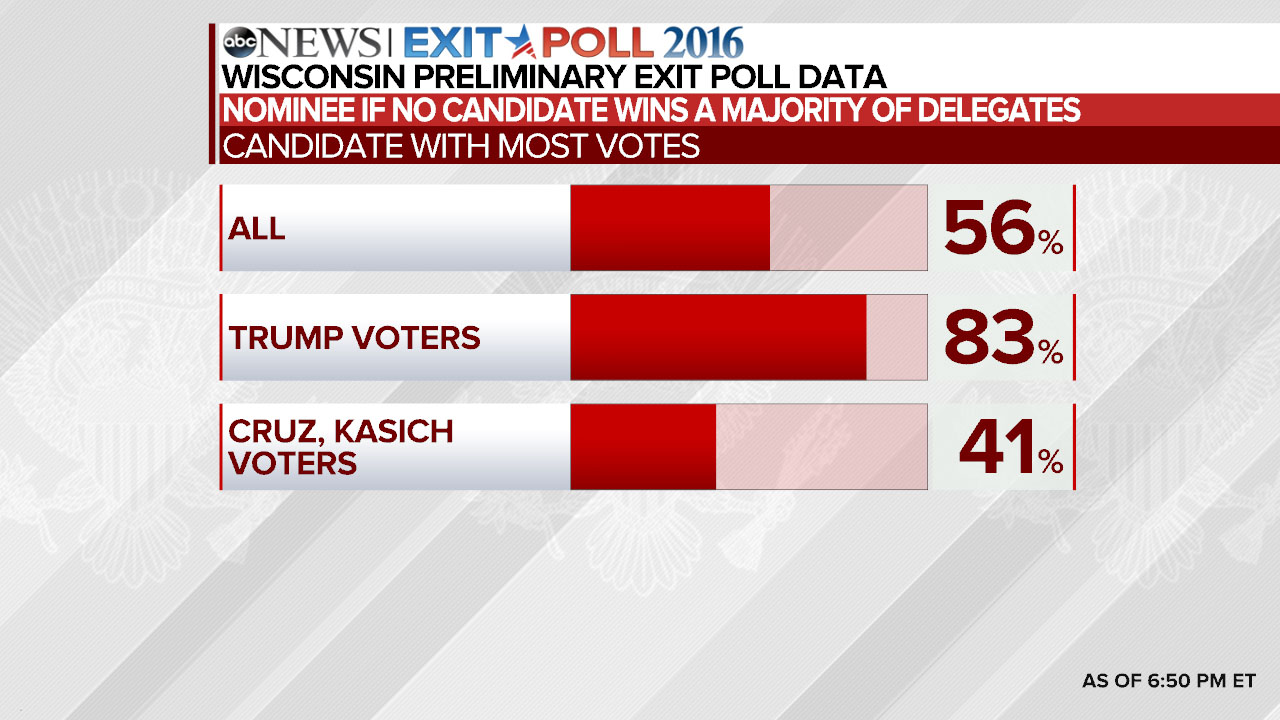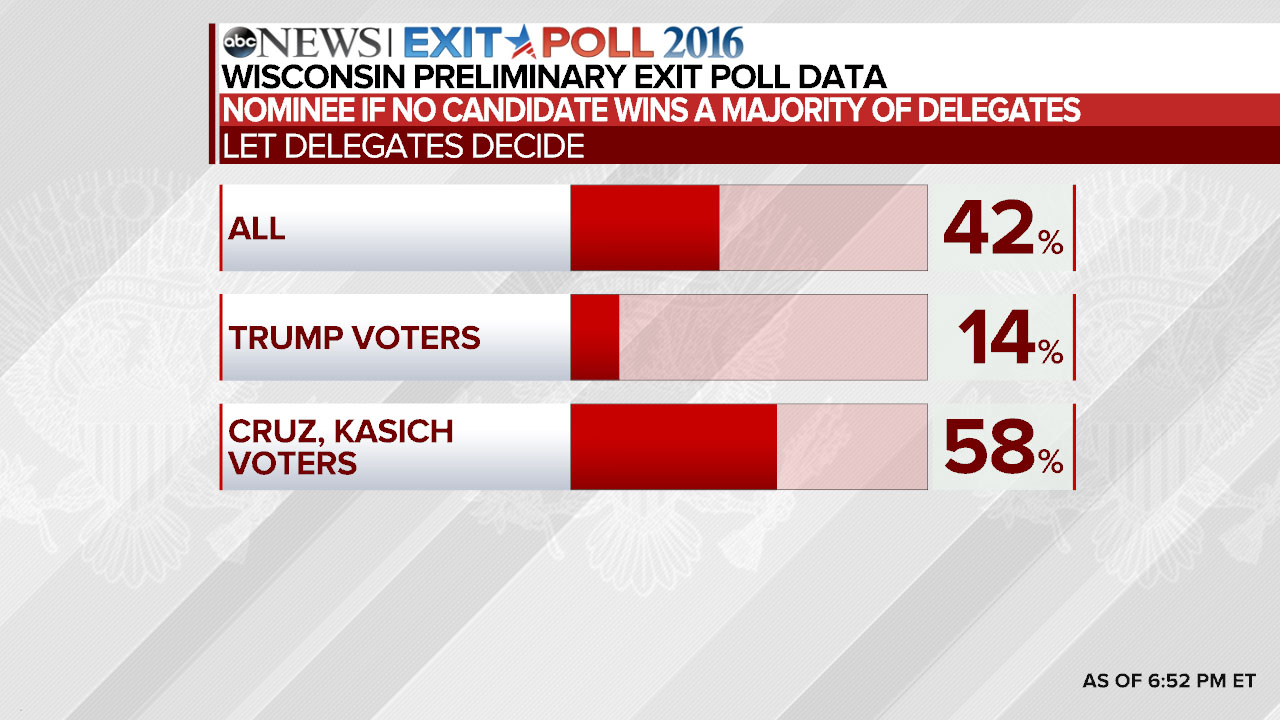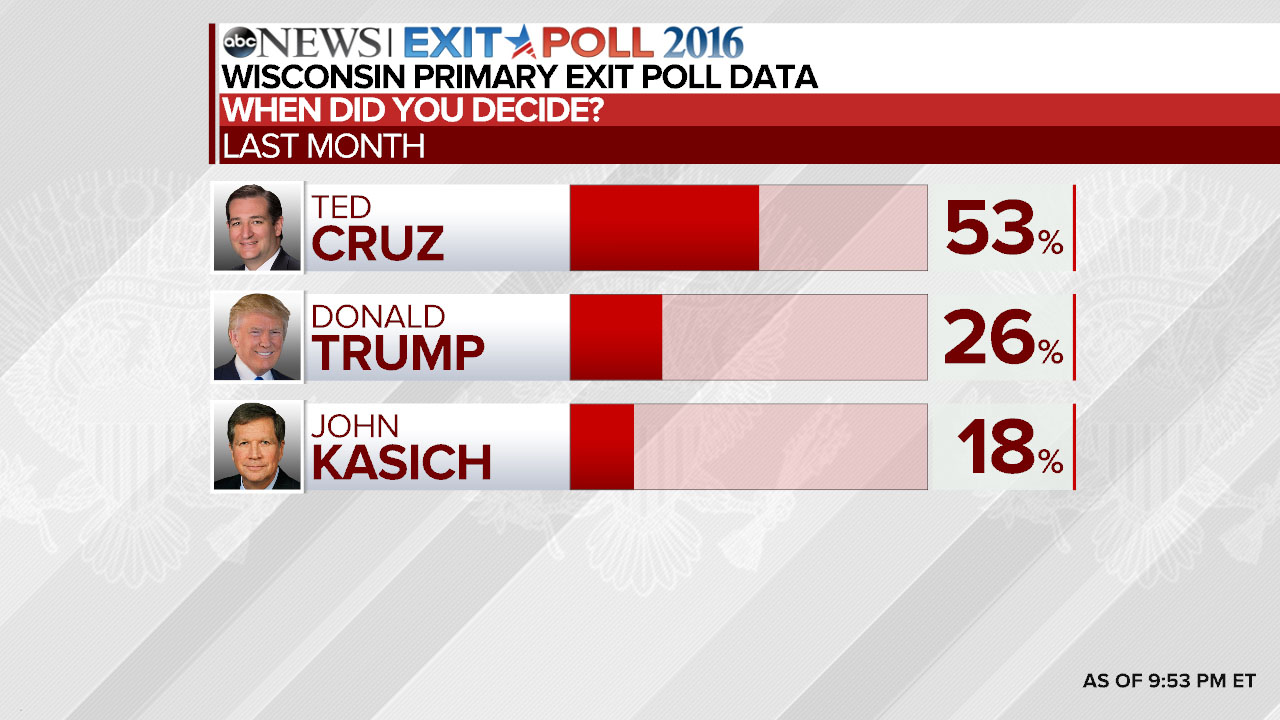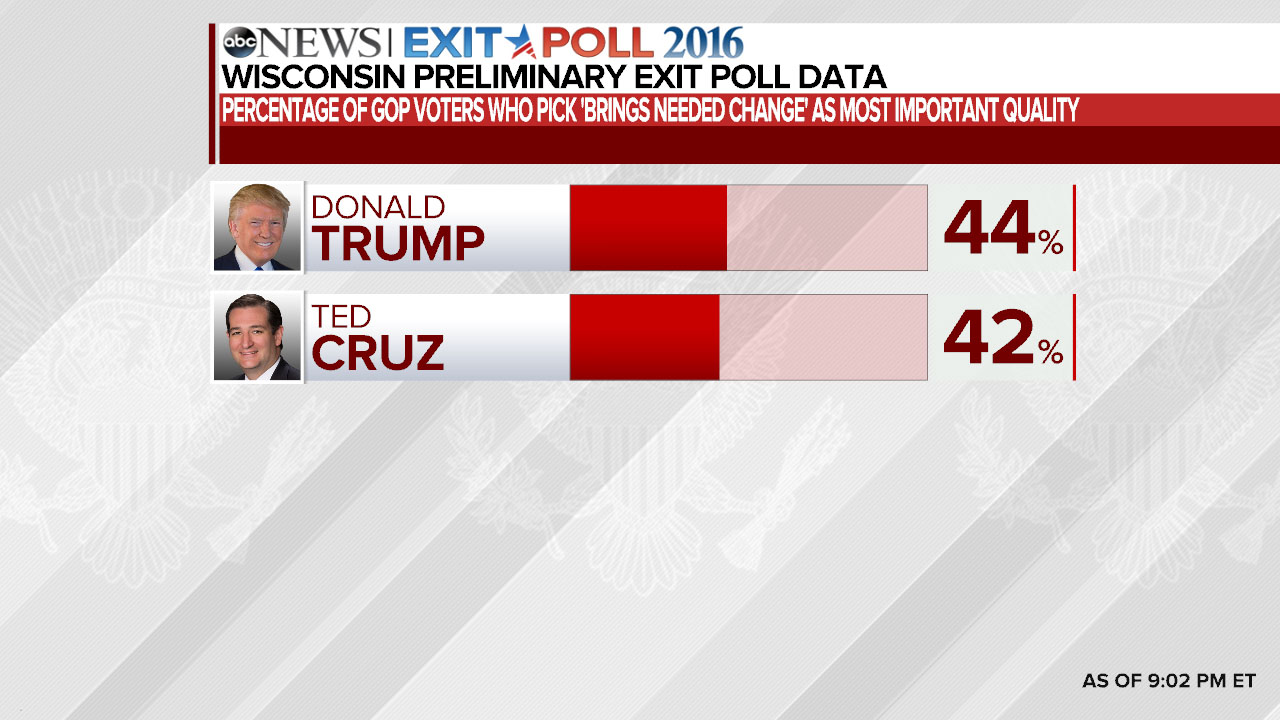Republican Primary Exit Poll Analysis
Here's a look at who voted and why.
— -- Who turned out in Tuesday's Wisconsin primary and what motivated their votes?
Preliminary exit poll results suggest a coalescing of the anti-Trump vote behind Ted Cruz in the Wisconsin presidential primary – raising the specter of a ceiling for Donald Trump.
Contested convention?
More than half of Wisconsin GOP voters say the candidate with the most votes in the primaries should win the party’s nomination, while four in 10 favor a contested convention, saying that delegates should pick whichever nominee they think best.

A sharp division on this question displays the current rifts within the GOP: Donald Trump’s supporters overwhelmingly oppose a contested convention. Those supporting Ted Cruz or John Kasich feel otherwise.

Optimism vs. concern
Six in 10 Trump voters say they’re excited about what he’d do as president. But, half of Cruz’s supporters, and six in 10 of John Kasich’s, say they’re “scared” of what Trump would do in the White House. That’s also reflected in the fact that six in 10 Kasich and Cruz voters say that if no candidate wins a majority of delegates, the convention should decide the nominee – while 84 percent of Trump voters say the candidate with the most votes should be the nominee, even if he lacks a majority of delegates.
Outsider vs Experience
Forty-four percent said they’re interested in an experienced candidate rather than an outsider (it’s averaged 41 percent in previous contests) – and Cruz won seven in 10 of those voters, more than twice his average, 33 percent. Other Trump issues simply played less well. Sixty percent supported legal status for undocumented immigrants, on track for a new high this cycle. (It was 59 percent in Virginia.). And “anger” at the federal government, at a third, was lower than its average in previous states, 40 percent. Angry voters have been and remained a pro-Trump group; but there were fewer of them; Cruz did better among angry voters who didn’t go for Trump; and Cruz did especially well among those who weren’t angry, doubling his usual score in this group.
While Trump is doing about as well as usual in most groups, Cruz is doing far better than usual. Compared with his average in previous primaries, he’s +36 points among voters looking for an experienced candidate, +24 among mainline Republicans, +22 among strong conservatives, +24 among voters focused on shared values and +23 among those who cite the economy as their main concern.
Deportation
More than six in 10 GOP voters in Wisconsin think undocumented immigrants should be offered a path to legal status, on track to be the highest of any state this year (it’s topped out at 59 percent in Virginia). Only a third support deporting undocumented immigrants, fewer than in previous primaries. Deportation voters have been a strong group for Trump in previous primaries; Cruz beat Trump in recent contests (North Carolina, Missouri and Illinois) among the larger group that favors a path to legal status, and Kasich won them in Ohio.
Who Would Beat Clinton
While Trump has held on to most of his previous support levels there’s one exception – he’s doing less well, and Cruz especially better – among voters focused on electability. Although they’re s small group, Cruz won seven in 10 voters who care most about the candidate who can win in November, up from 22 percent in previous contests. Trump won just two in 10 of these voters – down from a third previously. Also, asked who’d best be able to beat Clinton, 42 percent picked Cruz, 38 percent Trump.
Unfair campaigning
Many more people think Trump has run the most unfair campaign – more than half say so, vs. a quarter for Cruz and one in 10 for Kasich.
Late Deciders
Among the four in 10 who picked their candidate more than a month ago, Trump won 51 percent, Cruz 38 percent and Kasich 9 percent. Among the six in 10 who decided in the last month, by contrast, Trump’s support was sliced to 26 percent, while Cruz won 53 percent, Kasich 18.

Candidate Shares Voter Values
Roughly a third say it’s most important to them that a candidate shares their values, nearly as many as say someone who’ll “bring needed change” is most important. Cruz has won 40 percent of values voters in previous primaries, vs. 20 percent for Kasich and just 12 percent for Trump. Trump’s won 46 percent of “change” voters so far, vs. 23 percent for Cruz and 12 percent for Kasich.

Muslim ban
As has been the case throughout the GOP primaries this year, there’s broad support in these preliminary Wisconsin results (seven in 10) for Trump’s proposal to ban non-U.S. Muslims from entering the country. Trump’s won 47 percent of these voters in previous states, vs. Cruz’s 28 percent, but Cruz was much closer to Trump among these voters in some recent contests, notably in North Carolina and Missouri.
Nearly half of Wisconsin GOP primary voters think the U.S. should take a more active role in world affairs, while just three in 10 think it should be less active, a policy Trump has championed recently with regard to NATO. (The rest think it should be about as active as it is now.)
Third Party/Not Voting in November:
If the general election came down to Trump vs. Hillary Clinton, two in 10 GOP voters in Wisconsin say they’d vote for Clinton or stay home, slightly more than would do so if the contest were between Cruz and Clinton. Similar numbers would vote for a third party in both situations.

To Watch - Conservatives and Evangelicals
Cruz has been especially competitive in two groups in previous contests – “very” conservative GOP voters (winning 41 percent of their support across primaries to date) and evangelicals (winning 33 percent, vs. 18 percent from non-evangelicals). Both may be of interest in Wisconsin, even though in past years evangelicals have been less prevalent here than in other state primaries. In preliminary results, a third says they’re very conservative, among the most ever in exit polls back to 1976, while about four in 10 are evangelicals, a lot less than the average of 59 percent in 2016.
In preliminary results in Wisconsin, three in 10 GOP voters say they’re “very” conservative and four in 10 are evangelicals – about the norm for the state.